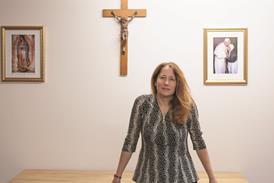‘My husband, John, and I were shocked to find out that our son Stephen was a heroin addict,’ says Betty Carter. ‘Stephen was on heroin for 18 months before we found out. We didn’t know anything about drugs at the time.’
Prior to Stephen’s drugs use, the Carters were ‘just a normal family bringing up two boys,’ says Betty. ‘We never had any trouble with the police. When Stephen was 13, he started to change for the worse. John and I were deeply worried about him. At school, he was disruptive in class. By the time he was 15 he was expelled. I began to notice that prescribed tablets, money and valuables were going missing from the house.’
From the age of 17, Stephen was in and out of prison for petty crimes such as breaking into cars, shoplifting and burglary. He began smoking cannabis in prison, and experimented with other drugs. ‘This became a way of life for him,’ Betty says.
For Betty and John, the times that Stephen was at home with them on curfew were tough. ‘Often the police would knock on the door at 2 or 3am to check that Stephen was abiding by his curfew. It was such a shock not knowing who was at the door, or what they wanted. One week these checks took place every day, and every night. It took us weeks to recover. The police said that they were entitled to do this. There was never a thought about how it was affecting me and John.’
Faith and Forgiveness
Raised as a Christian, Betty held onto her faith through these difficult years, although she rarely attended church. ‘I would pray and light candles for Stephen – I would just pray that he would go on the right path,’ she says. Betty found Psalm 5 helpful as she prayed: ‘Listen to my words, LORD, consider my lament. Hear my cry for help’ (Psalm 5:1-2, TNIV).
‘When he was 21, Stephen moved into a flat with his girlfriend...they had a beautiful baby boy, who they called Ashley Stephen. He was a loving father who doted on his son. I thought this would be the making of him. But his girlfriend threw him out after a row,’ says Betty. Stephen took heroin for the first time that night, although Betty and John didn’t find out that he was using the drug for 18 months. Today, Betty still struggles to forgive Ashley’s mother for not telling her about Stephen’s addiction. ‘I still cannot forgive her for not telling us that Stephen was taking heroin. Maybe one day I will forgive her, but at the moment I just can’t. It might come one day – I don’t know,’ she says.
Three years on, life for the Carters had become even more difficult. ‘When Stephen was in prison, we were relieved because he was safe and we knew where he was. It was a horrible experience when we had to visit him.’ Betty and John would pay the dealers what Stephen owed them ‘because if [we] didn’t, they would beat him up’.
‘The dealers phoned and threatened us,’ Betty says. ‘We had our windows knocked out and the car tyres slashed. It got so bad that I was afraid to go out of the house. The police would do nothing because we [said we] didn’t know who was doing it...but we did. We didn’t say anything because we were too scared.’
Stephen's Death
Stephen spent his 27th birthday behind bars after a six-week sentence for shoplifting. ‘On the day he was released, he looked lovely. His eyes and skin were clear. He looked as if he was clean,’ says Betty.
He went out that evening, but didn’t return that night or the next day. ‘Two days later there was a knock at the door. It was two police officers. They came to tell us what I was dreading. Stephen had been found dead in the local toilets, with a syringe still in his groin. It was a heroin overdose.
Because he had been clean for six weeks in prison, his body couldn’t take it.’
When Stephen died, Betty felt that God hadn’t listened to her prayers. ‘I thought, “There can’t be a God. Not when he takes people away like that.” I stopped going to church. I wouldn’t go near a church. If people asked what had happened to Stephen, I would say he died in a car crash because I felt so ashamed to tell them the truth.’
Betty and John asked the police where to get help. ‘The reply was, “Nowhere. See your GP.” You can imagine how we felt – like we were the dealers. Our grief was overwhelming and unbearable. We couldn’t talk to each other as a family. John, and my other son, Michael, both buried their heads in the sand. John turned to drink. I had no one to talk to.’
Finding Healing
Three years later, John and Betty came across a service that could help them. PROPS (Positive Response to Overcoming Problems with Substances) had just gone city-wide in Newcastle, where the Carters live. ‘If it wasn’t for the PROPS support worker, John and I would have split up,’ says Betty. ‘After a few months, we started talking normally to each other, even about Stephen’s death. From then on, our marriage started to work again.’
One weekend, Betty and John went away with PROPS for a retreat. ‘I wasn’t sure if it would help, but I thought I’d go along anyway,’ says Betty. The experience turned out to be a positive one, and as a result, she wanted to go on another retreat.
She and John booked to go to Marygate retreat centre on the Holy Island of Lindisfarne, where Betty was able to talk and pray with Ian, Marygate’s director, about all the family had been through. ‘We went into the crypt every morning and night, and we went into the church in the day and lit candles. I thought, “This seems to be doing some good,”’ she says.
During her visit to Lindisfarne, Betty noticed an unusual pebble while she was walking on the beach. ‘When I turned it over, it looked like the virgin Mary, kneeling and praying. It was as if it had been carved out. I couldn’t believe it. I thought, “This is a sign from God.” Betty and John now go to Lindisfarne several times a year. ‘We find it so relaxing; you feel close to God when you are there’, she says. As a result of those visits, she feels she has ‘certainly got my faith back’.
For a Reason
Betty now works voluntarily for PROPS and Safe Newcastle, telling her story in local colleges, prisons, and to the police. ‘It helps them think about the addicts’ families,’ she explains. ‘Then you know that another family isn’t going to be treated like you were.’
Betty also speaks to addicts and recovering addicts. She explains how they sometimes respond to her story: ‘I was telling one lad about Stephen, and he turned around and said, “Do you know what, I’m going to phone my mum up tonight, and see if she’s all right.” Another said, “I didn’t realise what I was putting my parents through.”
‘A lot of good has come out of what happened to Stephen, which is why now I say, “Everything happens for a reason.”’



























